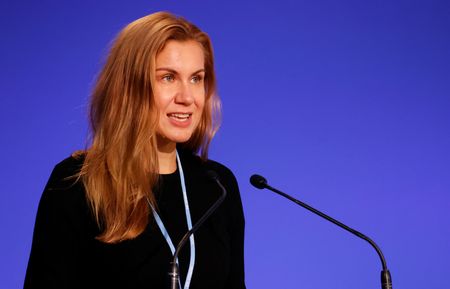By Kate Abnett
BRUSSELS (Reuters) -The European Union could introduce a gas price cap this winter to limit excessive price spikes, but only if countries give Brussels a mandate to propose the measure, the bloc’s energy chief said on Wednesday.
After months of high gas prices driven by Russia slashing supplies, the 27-country EU is considering whether to cap prices – although with countries still split over the idea after weeks of talks, Brussels has not yet made a formal proposal to make it happen.
The European Commission said last week it could make a legal proposal for a temporary “dynamic” cap on the Dutch Title Transfer Facility (TTF) gas exchange, if EU countries asked for such a proposal.
EU energy commissioner Kadri Simson said it would still be possible to have that cap in time for winter. The Commission has said the price limit would be designed to kick in as a “last resort measure” if prices spike.
“This Dutch TTF gas benchmark cap, we can introduce this winter already if we get the mandate,” Simson told a committee of EU lawmakers.
EU countries could provide that mandate at an emergency meeting of EU energy ministers on Nov. 24, when they will decide whether to ask Brussels to propose the cap.
But a consensus on the idea appeared elusive when energy ministers met on Tuesday, with countries still split.
Germany leads a small group of states opposed to price caps, warning that limiting the price companies can pay for gas could compromise their ability to buy enough fuel as Europe heads into winter with scarce Russian supplies.
Italy, Belgium, Poland and 12 other states want an EU-wide price cap, citing the inflationary pressure that recent gas price spikes have unleashed on their economies.
Uusually, a reinforced majority of 15 ministers from EU countries would be able to pass the measure. But German chancellor Olaf Scholz said last week that the ministers’ decision would be “unanimous” – suggesting one country would be able to block it.
(Reporting by Kate Abnett, Charlotte Van Campenhout; Editing by Emelia Sithole-Matarise)

